Adoption had been on our heart for years. And in August of 2014, after lots of prayer, we accepted God’s call to adopt.
We completed our home study, filled out the medical checklist, put together lots of paperwork, prepared our home for another child, and waited to see our child’s face for the first time. By late March of 2015, our dossier had been logged in for three weeks, and we had been waiting not-so-patiently for God to show us our son or daughter.
Then, one afternoon in late March, our social worker called and asked if I would like to see the file of a nine-month-old boy with cleft lip and palate. Of course, I said yes as fast as I could. We received the file of a beautiful, fearfully and wonderfully made little boy who had an open cleft lip and palate.
Was this our son? I know of so many in the adoption community who saw the photo of their child and instantly knew that they were looking into the eyes of their child. I did not.
I saw the cleft lip and palate, one of the special needs that we had checked yes on the medical checklist, and I was scared. But we knew that God would reveal to us if He meant for this child to be our son, so we began to pray. We prayed for some specific things throughout the next few days and God continued to show us that this was our son.
While we prayed, we sent his file to a friend who is a doctor, our pediatrician, the pediatric plastic surgeon, and we requested an update from his orphanage.
We also knew that we wanted to talk to others who have walked this road, so I immediately called a friend who has two daughters from China who both came home with repaired lips and unrepaired palates. I also spoke to another friend who had brought home a son with an open lip. I wanted to understand what to expect as far as surgeries during the first year or so home, as well as future surgeries and these two friends gave me such great insight into the world of cleft. One friend said that cleft is not a day-to-day special need that you think about all the time. It is a surgery-to-surgery need.
Both friends told me their children’s stories with surgeries and recovery, as well as the diet restrictions that followed surgeries. And, they both described their children’s experiences with speech therapy. All of the information they gave me helped me to gain perspective on what to expect if we ventured into the world of cleft.
A few days later we received an update from his orphanage in China that confirmed that he was growing and developing well. We also learned that in the months since his file was created he had received two lip repair surgeries in China, about six weeks apart.
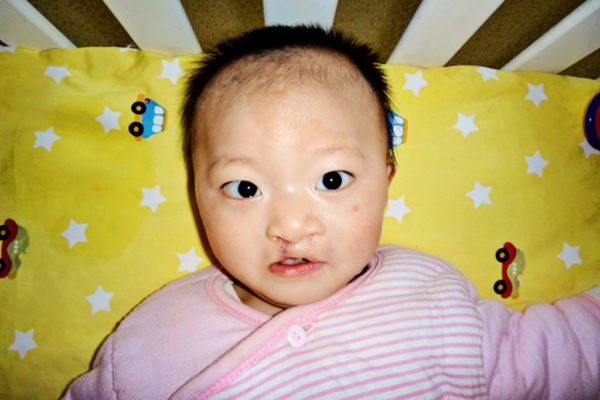
After a couple of days of prayer and discussion, it was clear to us that God had shown us our son and we submitted our Letter of Intent to adopt our son Paxton.
A little over three months later in July of 2015 we were holding our son in our arms surrounded by his big brothers.
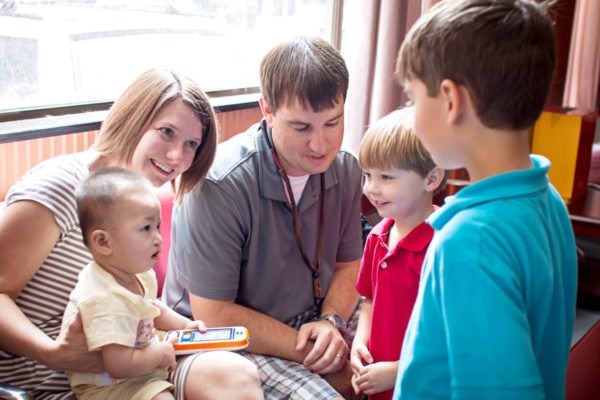
Paxton turned 13 months old while we were in China and I knew that his eating ability could be very limited if he had only experienced formula or congee. We came prepared with lots of soft foods and baby food pouches. We were pleasantly surprised to see that he had no problem eating almost anything and everything we gave him. The only things he would not eat were the soft foods like the baby food and apple sauce pouches we brought!
He loved crunchy things that he could chew like pizza crust! He easily drank from a cleft bottle that we had brought with us by biting it to release the liquid. His nannies told us that he did not like formula and that he only took a bottle at night. We were only able to get him to drink about an ounce of formula every day while we were in China, so we quickly switched him to whole milk when we returned home, which he liked much better.
After returning home, we scheduled a visit with the cleft team at Children’s Hospital of Georgia in Augusta. Our plastic surgeon speaks English and Mandarin and spoke to our son in Mandarin during our first visit. We quickly had surgery scheduled for late September 2015.
In the two and a half months since he had been a part of our family, food had been a signficant way to comfort for our son. He loved to eat, but he would only eat food that he could chew. He refused anything that did not have to be chewed: yogurt, pudding, applesauce, soup, even ice cream! Since we had been told to keep him on a liquid diet that could include runny foods like yogurt and ice cream for two weeks post-surgery followed by a soft diet of foods like macaroni and cheese for four additional weeks, we knew that food following surgery would be a struggle.
In addition to the restricted diet, he would be required to wear no-nos on his arms to keep his hands out of his mouth. Since coming home, he had had a specific way of putting his fingers in his mouth for comfort and he would not be able to do that for weeks.
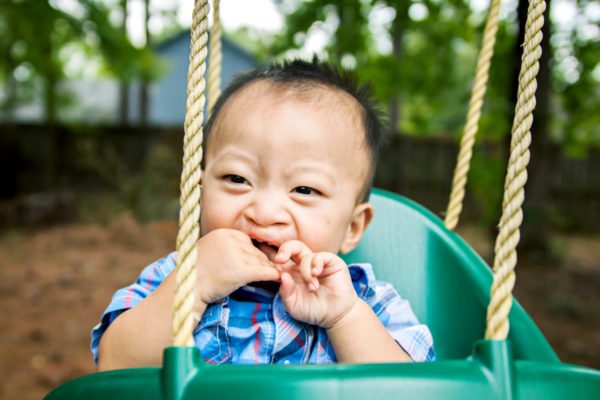
The surgery went well and after one night in the hospital, we were released to take him home. We spent a lot of time holding, cuddling, and comforting him while trying to manage his pain and confusion during the first few days after surgery. We also spent a lot of time trying to find liquid foods that he would eat. He survived on milk, water, runny pudding, and melted ice cream for the first few weeks.
Sleep was a struggle for the first week because the pain combined with not being able to put his fingers in his mouth made it hard for him to sleep. But after a week, the pain slowly diminished and he learned to sleep without his fingers. Keeping the no-nos on him, especially at night, was very difficult. He could somehow pull them off multiple times a night. I cut the toes out of socks and pulled them over his no-nos to help keep them on his little arms.
After six weeks he was released from all food restrictions and he happily went back to eating his favorites: pizza, goldfish, chips, and any other crunchy food he could find!
Due to the size of his cleft, we were told that there was a decent chance that he would end up with a fistula (a hole). Our son did, indeed, end up with a fistula behind his front teeth that will have to be repaired in a future surgery, but his doctor would like for him to grow more before doing the fistula repair.
Some children with cleft lips and palates require fewer surgeries than others, but our doctor has prepared us that our son will need several more surgeries in addition to the fistula repair. He will definitely have a bone graft surgery when he is in elementary school, but he will probably have several other surgeries throughout his childhood and teenage years.
We are just thankful that we are the ones who get to walk beside him and comfort him through the future surgeries and recoveries.

As my friend said, cleft is not a day-to-day special need that you think about all the time. It is a surgery-to-surgery special need. For us, this is definitely true.
We have been home for two years this month and the only aspect of cleft that we think about on a regular basis is the need that arises for speech therapy. We started speech therapy very quickly after coming home through our state’s early intervention program. He started with one 30-minute session a week for the first year and then added a second session a week for the last year. His receptive language has always been on target, but his expressive language and articulation is delayed due to his cleft limitations.
We will transition to the public school’s speech therapist once school starts back in August since he aged out of the state’s early intervention program when he turned three this summer. We will continue to see our speech therapist once a week by billing through our insurance (instead of the early intervention program), as well as the school system speech therapist, in order to provide him with the best opportunities to develop his speech abilities.
Although speech therapy takes time and work, attending speech has been such a fun experience for both of us. I love the time that I get to spend with him at speech, and he thinks he is just there to play. We are so proud of how far he has come and we see small improvements every day. The little accomplishments are huge.
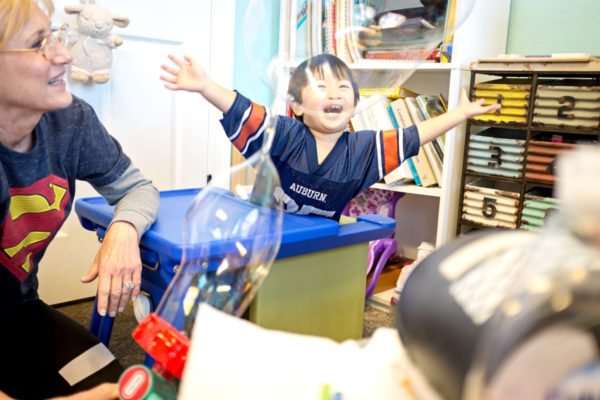
Our son has experienced more trauma in his short life than I have in my entire life. He will continue to have more surgeries and speech will probably never come as easily for him as it does for most children. But, he is happy and brave and strong and amazing.
He is definitely a super hero disguised as a toddler.
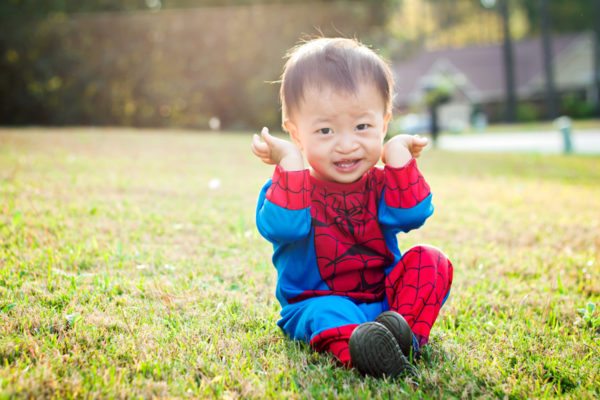
Yes, we were scared when we first saw our son’s file. But I am so thankful that we did not give in to the fear and say no. I am so thankful that God revealed to us that He had indeed shown us our son, our fearfully and wonderfully made son.
I look at our son and think about his birth parents often. His mouth is the part of his body that probably caused so much heartache for his birth parents because of the choices that they had to make for his life. However, his mouth is the part of his body that I adore the most because it forms the sweetest, happiest smile that makes anyone and everyone smile when they see it!
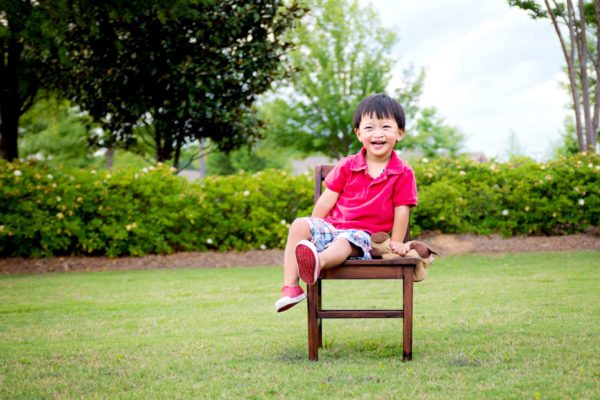
– Psalm 139:14
– guest post by Kasey

























I love your story it is so similar to ours. Yet you have a better way with with words. God bless your perfect little boy and your beautiful family. Thank you for sharing.
Thank you so much! I would love to hear your story and I’m sure that however you tell it would be beautiful!